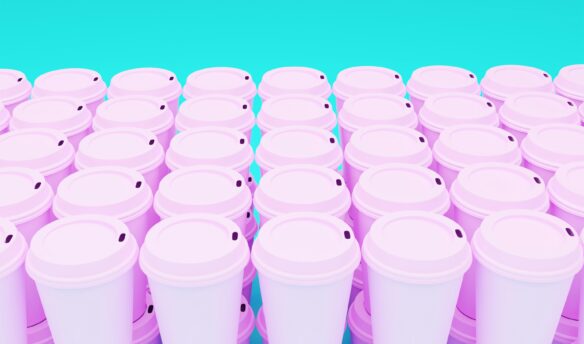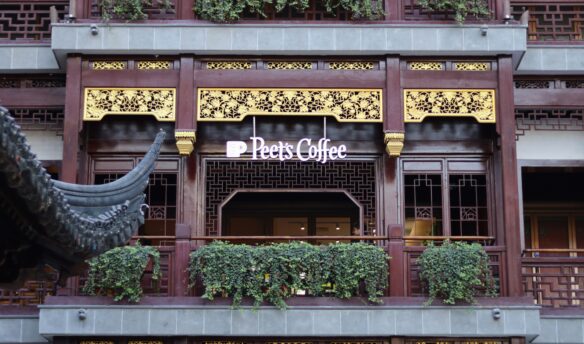ICE is targeting children in Hawaii’s coffee-growing regions. Plus, it’s a union double bill in Boston, tariffs are starting to impact coffee gear manufacturers, and visiting Venice? You can get a coffee made with canal water.
‘ICE Takes Aim At Immigrant Kids In Big Island’s Coffee Belt’ – via Honolulu Civil Beat
The current U.S. presidential administration has widely expanded Immigration and Customs Enforcement (ICE) raids over the last few months. Now, ICE officers are targeting children living in the South Kona region of Hawaii, where most of the state’s coffee comes from.
Many migrants from Mexico and Honduras come to Hawaii to work on one of Kona’s 600 coffee farms. Because of that, Kona, located on Hawaii’s Big Island, has the state’s largest and fastest-growing Latino population. Jeremy Hay reported for Honolulu Civil Beat that the area has now become a “proving ground” for a new ICE enforcement strategy that “[snares] undocumented immigrant children and the adults in their lives.”
Hay described instances where ICE agents conducted supposed welfare checks on minors labeled by the government as Unaccompanied Alien Children—youths stopped while crossing the border alone and placed with relatives or other sponsors in the U.S. ICE used the checks to gather information about the sponsors’ whereabouts. According to Hay’s reporting, these checks were used to locate the sponsors, who were then detained, often along with the children they were caring for.
Some of the raids have taken place on coffee farms, leaving many immigrant workers who came to Hawaii for farm jobs now living in fear and constantly watching their backs. “I have no peace,” said Juan, an immigrant from Honduras who works on several farms and grows coffee on a patch of leased land.
This isn’t the first time ICE raids have impacted Hawaii’s coffee industry. Hay’s article notes that raids happened during the last Trump administration, and at least one coffee farmer was deported in 2017 during President Barack Obama’s second term.
The state’s coffee sector relies heavily on migrant laborers. This year, many workers are not taking the risk. Armando Rodriguez, a farmer and founder of the advocacy group ALOHA Latinos, explained how a lack of workers puts the state’s coffee harvest at risk. “I’m predicting we’re going to lose a lot of coffee because there’s a lot of coffee on the trees,” he said.
‘SF Bougie Coffee Startup Held Hostage by Trump’s Trade War’ – via The San Francisco Standard
The coffee industry is facing uncertainty and chaos due to the Trump administration’s threat (and partial implementation) of tariffs. The cost to import green coffee has jumped and roasters and cafes are raising prices in response.
China is one of the hardest-hit countries, with the administration placing a 145% tariff on the country’s imports. For coffee equipment manufacturers who rely on Chinese imports, these steep tariffs could significantly raise costs and prove financially devastating.
As reported by Kevin Truong for The San Francisco Standard, one company impacted by tariffs is Fellow Products, an equipment brand that makes high-end coffee products like kettles and grinders.
In April, Fellow launched a new, much-hyped espresso machine that cost nearly $6 million to bring to market. The machine, called the Espresso Series 1, will retail at $1499. Fellow launched a lower-cost pre-order campaign where folks could reserve a machine now and receive it when production was forecasted to be complete by winter.
However, Truong wrote, “tariffs threw a last-minute snag that scrambled a meticulously planned launch strategy.” Fellow manufactures its coffee gear in China (they employ about 25 workers there, according to Truong), so now the company is trying to figure out what to do, not just with the new espresso machines, but with all their coffee products.
Fellow CEO Jake Miller called the tariffs “the most disruptive thing that has ever happened to us.” He said since tariffs were implemented, Fellow has not imported any products into the United States. “We’re just sitting on our hands,” he told Truong.
The ostensible reasoning behind Trump’s tariffs is to bring manufacturing back to the US, which experts say would be difficult or impossible. Miller said if Fellow made their new espresso machine in the U.S., it would quadruple in price. Even then, he said there aren’t many companies that could make the espresso machine domestically. “People in the U.S. do not want to manufacture coffee makers and grinders. They just don’t.”
China manufactures most consumer coffee gear, not just for Fellow, but for most US-based coffee gear companies. China also makes commercial equipment like machines to fill and seal coffee bags, not to mention disposable cups and the coffee bags themselves.
Miller is looking for alternative production locations, and says that Fellow is lucky to be an established company—he believes other companies might be unable to handle the fluctuations and uncertainties. “There’s going to be a very large graveyard of hardware startups and early-stage companies that just can’t deal,” he said.
‘Coffee Flavored by Venice Itself’ – via The New York Times
When people say they want to “get a taste” of a city while travelling, they’re usually speaking metaphorically. However, at this year’s Architecture Biennale in Venice, Italy, visitors can enjoy espresso literally made with water from the city’s famous lagoon.
Held every two years since 1980, the Architecture Biennale is a sprawling exhibition of international architecture held in locations around the iconic water-bound city. At this year’s event, a design studio and two engineering firms have built Canal Café, which uses a series of filtration tanks to purify the lagoon water before brewing and serving it to guests, A.J. Goldmann reports for The New York Times.
Water is drawn from the lagoon and split into two filtration streams using a series of transparent pipes and tanks so visitors can watch the action. The first stream uses a “microwetland” of salt-tolerant plants, which filter the water biologically while retaining its mineral content; the second uses reverse osmosis and ultraviolet light to disinfect the water. At the end, the two streams are blended together.
The cafe is meant to provoke visitors to contemplate a future where clean water is precious. “We could say that the project is a prototype of the global dilemmas we face in a time of increased climate change when our infrastructures must adapt,” Biennale director Carlo Ratti told Goldmann. “It’s visceral — to drink or not to drink — and will provoke people to confront the issue that is literally right in front of them.”
The filtration being visible is essential, according to Elizabeth Diller of Diller Scofidio + Renfro, the firm that came up with the design. The cafe aims to combine “the sort of pleasure of drinking beautiful espresso while also thinking about the complexity that it takes to actually have potable water,” Diller said.
More News
‘Brazil Specialty Coffee Association and the Specialty Coffee Association Announce strategic partnership’ – via Tea & Coffee Trade Journal
‘Coffee Coalition for Racial Equity Honors BLK & Bold, Keith Hawkins and Martell Mason’ – via Daily Coffee News
‘China Adds 12,000 Coffee Shops As Thirst Among Masses Grows, Starbucks Suffers’ – via South China Morning Post
‘Cafetón Is Chicago’s Blockbuster Reggaeton Coffee Party’ – via Eater Chicago
‘Luckin Coffee Is Opening A New York City Location’ – via Sprudge
‘Fairtrade Launches’ LIRP on Demand’ to Streamline Living Income Price Discovery’ – via Daily Coffee News
The Week in Coffee Unionizing
Members of the Blue Bottle Independent Union walked out during their shifts last week due to stalled contract negotiations. Employees from five Blue Bottle locations walked out and had no baristas working, Katelyn Umholtz reports for Boston.com.
Organizers claim Blue Bottle “illegally declared an impasse in negotiations” over a disagreement about installing security cameras.
The company wants to install cameras at cafes, something the union agreed to in exchange for “just cause” protections in the contract. The clause would require Blue Bottle to meet specific standards, such as offering sufficient proof, to bring disciplinary measures against workers. However, the company installed the cameras before the contract was finalized, leading to the negotiation breakdown.
The union set a deadline to restart negotiations, but when that passed, baristas walked out. “Let us be clear: Blue Bottle is not attempting to install surveillance cameras to improve café security, they are doing so to bust our union,” the union wrote on Instagram. “While our priority in bargaining sessions has been fighting for a democratic workplace with livable wages, scheduling security, and protection from harassment, Blue Bottle’s myopic focus has been on forcing discussion on surveillance cameras.”
Workers unionized in April 2024, citing low pay, manager turnover, and lack of training at Blue Bottle’s six Boston locations. After voting to form the independent union a month later, workers have been negotiating a first contract with the company ever since.
That’s not all that’s happening in Boston. Tori Bedford reports for Boston Public Radio that workers at seven Boston-area Blank Street Coffee locations are unionizing. Backed by a supermajority of the chain’s roughly 70 Boston-based employees, organizers delivered a letter last week to Wendy Johnson, the company’s U.S. director of operations.
The letter requested voluntary recognition from the New England Joint Board of Unite Here and noted the chain’s fast growth and the need for a union to assist its growing workforce. “Having the support of a union will ensure workers are protected along the way,” the letter said.
This isn’t the first time workers at the venture capital-backed chain have tried to unionize. In 2022, workers across 20 locations in New York City organized, and they ratified a contract two years later.
Unlike many other union efforts at coffee chains nationwide, Blank Street workers in New York pointed out that the managers and owners largely avoided using anti-union rhetoric during their campaigns. One barista interviewed by Hell Gate in 2023 put this down to the company’s relatively small size compared to bigger chains like Starbucks: “Even if Blank Street wanted to do hardcore union-busting, they probably wouldn’t be able to afford it,” they said.
Whether that will be the case in Boston remains to be seen: the company declined to comment to Boston Public Radio or confirm whether Blank Street would voluntarily recognize the union.
Beyond the Headlines
‘The World Badly Needs A Global Coffee Seed Vault’ by Jenn Chen
‘A Short Lexicon of Coffee Buzzwords’ by Ashley Rodriguez and Fionn Pooler






